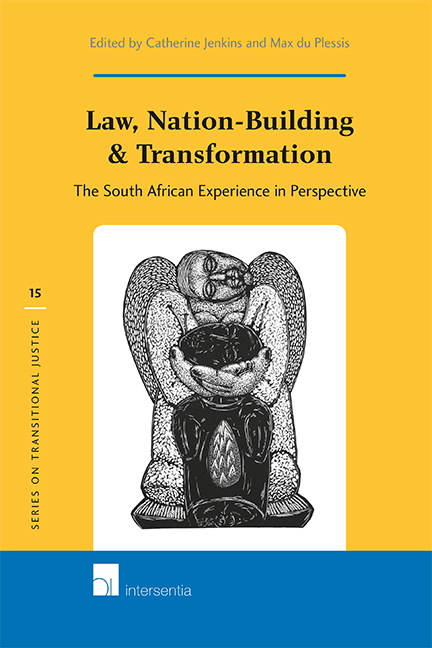Book contents
- Frontmatter
- Editors’ Foreword
- Contents
- Chapter 1 Transitional Justice: Lessons from South Africa?
- Chapter 2 Reflections on Post-Apartheid Nation-Building: Identity, Participation, Community
- Chapter 3 The Truth and Reconciliation Commission Process: A Retrospective
- Chapter 4 Rights at Work: The Transition to Constitutional Democracy and Women in South Africa
- Chapter 5 Crime, Policing and Nation-Building
- Chapter 6 Public Schools for Afrikaners in South Africa
- Chapter 7 Behind the Mask of the Rainbow Nation: The Limits of Law in Post-Apartheid South Africa
- Chapter 8 The Transformation of the Judiciary
- Chapter 9 Assessing the Social Transformation Performance of the South African Constitutional Court: From Totalitarianism to the Rule of Law
- Chapter 10 The Transformation of Land Law
- Chapter 11 The South African Presidency in Comparative African Context
- Chapter 12 Aspects of the Treatment of Freedom of Expression in South Africa’s Democratic Transition
- Chapter 13 Constitutionalism in Commonwealth Africa: Comparative Perspectives
Chapter 1 - Transitional Justice: Lessons from South Africa?
Published online by Cambridge University Press: 16 December 2020
- Frontmatter
- Editors’ Foreword
- Contents
- Chapter 1 Transitional Justice: Lessons from South Africa?
- Chapter 2 Reflections on Post-Apartheid Nation-Building: Identity, Participation, Community
- Chapter 3 The Truth and Reconciliation Commission Process: A Retrospective
- Chapter 4 Rights at Work: The Transition to Constitutional Democracy and Women in South Africa
- Chapter 5 Crime, Policing and Nation-Building
- Chapter 6 Public Schools for Afrikaners in South Africa
- Chapter 7 Behind the Mask of the Rainbow Nation: The Limits of Law in Post-Apartheid South Africa
- Chapter 8 The Transformation of the Judiciary
- Chapter 9 Assessing the Social Transformation Performance of the South African Constitutional Court: From Totalitarianism to the Rule of Law
- Chapter 10 The Transformation of Land Law
- Chapter 11 The South African Presidency in Comparative African Context
- Chapter 12 Aspects of the Treatment of Freedom of Expression in South Africa’s Democratic Transition
- Chapter 13 Constitutionalism in Commonwealth Africa: Comparative Perspectives
Summary
‘With the successful conclusion of the constitutional negotiations of 1992 and 1993, we South Africans embarked on an experiment that placed particular emphasis on the legal system, and accorded especial responsibility to the legal profession. It was an experiment of massive proportions: a commitment to legal regulation as the framework for social development, and for the resolution of conflicting social claims… The successful endorsement of the constitutional experiment by the parties at Codesa and Kempton Park is in many circles regarded as a “miracle”. But at this stage, it is no more than an experiment.’
Edwin Cameron, 2007INTRODUCTION
In the 1990s, the first democratic elections in South Africa and the early postapartheid era under the presidency of Nelson Mandela commanded widespread international interest and, indeed, much admiration. The language of the South African ‘miracle’, referred to above by Justice Cameron of the Constitutional Court of South Africa, achieved common currency. Archbishop Desmond Tutu suggested in 2004 that South Africa's success was particularly important because the country was ‘so utterly improbably a beacon of hope for the rest of the world’. Some aspects of the South African experience have been an inspiration to other societies emerging from conflict or repression: South Africa's process of constitution-making has received considerable international attention for this reason, as has the work of the South African Truth and Reconciliation Commission (‘TRC’). A striking feature of the transitional justice movement has been its interest in comparative perspectives. Just as South Africans attempted to learn from the experiences of transition in Latin America and Eastern Europe, so South Africans have received invitations to speak and consult internationally on how to deal with a legacy of gross human rights violations. In the 1990s, South Africa became the poster-child for the concept of ‘reconciliation’ in transitional societies, and President Mandela was personally widely admired as the great reconciler. As former US President Bill Clinton put it: ‘One lesson we all have to learn from Mr. Mandela is how to build a community across divisions of race, religion and tribe.’
In recent times, however, the fault-lines in South African society have increasingly come into focus. Reports of poverty, inequality and crime, of protests at lack of service delivery, of xenophobia, of police violence, and of increasing racial tensions and the polarisation of political discourse, have appeared in the world's press.
- Type
- Chapter
- Information
- Law, Nation-Building and TransformationThe South African Experience in Perspective, pp. 1 - 40Publisher: IntersentiaPrint publication year: 2014
- 1
- Cited by

